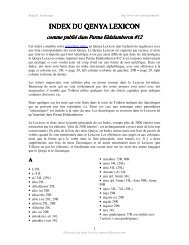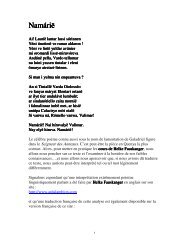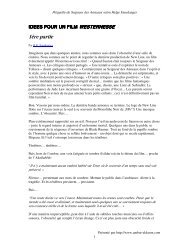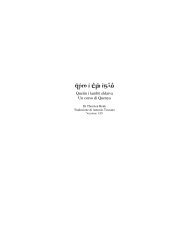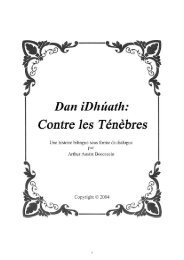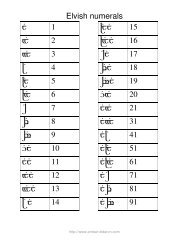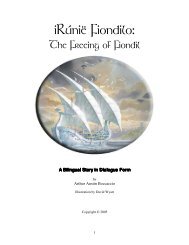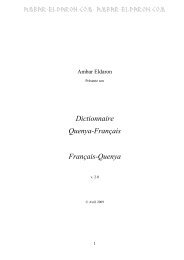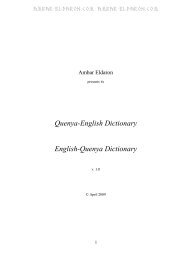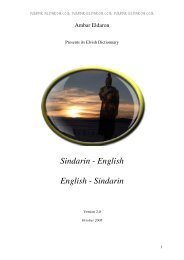Quenya Reverse Wordlist - Ambar Eldaron
Quenya Reverse Wordlist - Ambar Eldaron
Quenya Reverse Wordlist - Ambar Eldaron
Create successful ePaper yourself
Turn your PDF publications into a flip-book with our unique Google optimized e-Paper software.
Helge K. Fauskanger http://www.uib.no/People/hnohf/<br />
the voiced plosive that follows, and then regularly<br />
becoming r); if so, the name means *"Tower-friend"<br />
(Appendix A)<br />
ligniR Ringil name of one of the great<br />
Lamps (pillared on ice), apparently contains ringë<br />
(RINGI)<br />
ligniw wingil (wingild-, as in pl. Wingildi)<br />
"nymph" (WIG, LT1:273); "Qenya" pl. wingildin<br />
"foam-fays, foam-maidens" (MC:216)<br />
lima amil "mother" (AM 1 )<br />
limam mamil "mother" (UT:191)<br />
limúR Rúmil masc. name, genitive Rúmilo<br />
(WJ:398)<br />
lin -nil = Old English "-wine", sc. "-friend"<br />
as an element in names (NIL/NDIL). Variant of -ndil.<br />
In Eärnil, contraction of Earendil.<br />
linrac Carnil ("k") name of a star (or planet),<br />
identified as Mars (MR:435)<br />
linraE Eärnil masc. name, contraction of<br />
Eärendil (Appendix A)<br />
lipil lipil "little glass" (LT1:258)<br />
liramliS Silmaril (Silmarill-, as in pl.<br />
Silmarilli) name of the shining jewels made by<br />
Fëanor; full sg. form Silmarillë (SA:sil, SIL, RIL,<br />
MIR). Translated "radiance of pure light" in<br />
Letters:148. Gen. pl. Silmarillion, as in (Quenta)<br />
Silmarillion "(the Story) of the Silmarils".<br />
liratI Itaril (*Itarill-), Itarillë, Itarildë fem.<br />
name, Sindarized as Idril (PM:346, 348; SA:ril). (In<br />
earlier sources, Tolkien used Irildë as the <strong>Quenya</strong><br />
form of Idril.)<br />
liravat tavaril "dryad, spirit of woods"<br />
(evidently fem.) (TÁWAR)<br />
lirim miril (mirill-, as in pl. mirilli) "shining<br />
jewel" (MBIRIL)<br />
liris siril "rivulet" (SIR)<br />
lirúdnA Andúril "Flame of the West",<br />
sword-name (LotR1:II ch. 3)<br />
lis sil- "shine" (white), present tense síla<br />
"shines, is shining" (FG); aorist silë, pl. silir (The<br />
Return of the Shadow:324), frequentative sisíla-<br />
(Markirya comments)<br />
lisI Isil "Moon" (FS; SA:sil, Appendix E,<br />
SD:302, SIL; also defined as "the Sheen" under<br />
THIL)<br />
lisraN Narsil (Þ) the sword of Elendil,<br />
compound of the stems seen in Anar "Sun" and Isil<br />
"Moon"; see Letters:425 for etymology<br />
liteuqin niquetil ("q") "snowcap" (LT1:266)<br />
liteuqinaT Taniquetil (Taniquetild-) the<br />
highest of the mountains of Valinor, upon which were<br />
the mansions of Manwë and Varda; properly, this<br />
name refers to the topmost peak only, the whole<br />
mountain being called Oiolossë (SA:til). The<br />
Etymologies has Taniquetil, Taniquetildë ("q") (Ta-<br />
43<br />
niqe-til) ("g.sg." Taniquetilden, in mature Q dat.sg.)<br />
"High White Horn" (NIK-W, TIL, TA/TA3, OY)<br />
litlen neltil (neltild-, as in pl. neltildi)<br />
"triangle" (TIL, NEL)<br />
litniw wintil "a glint" (LT1:261)<br />
litueq quetil ("q") "tongue, language"<br />
(KWET)<br />
liv [vil-] "to fly" (The forms given are the 1.<br />
pers. aorist vilin "I fly" and the pa.t. villë. Changed to<br />
wilin, pa.t. presumably *wille.) (WIL)<br />
liw wil- "fly" (1. pers. aorist wilin "I fly";<br />
changed from vilin pa.t. villë; new past tense<br />
presumably *willë) (WIL). The early "Qenya" lexicon<br />
has wili- "sail, float, fly" (LT1:273)<br />
locnaT Tancol ("Tankol") "Signifer", "the<br />
significant star" = Venus (MR:385)<br />
lodnassuR Russandol "Copper-top", a<br />
nickname (epessë) of Maitimo/Nelyafinwë (=<br />
Maedhros) (PM:354)<br />
lognaytE #Etyangol (*Etyangold-), pl.<br />
Etyangoldi ("Etyañgoldi") "Exiled Noldor"<br />
(WJ:374). Sg. probably *Etyangol (*Etyangold-).<br />
lóm mól "slave, thrall" (MÔ)<br />
lot tol "island, isle" (rising with sheer sides<br />
from the sea or from the river, SA:tol). In early<br />
"Qenya", the word was defined as "island, any rise<br />
standing alone in water, plain of green, etc"<br />
(LT1:269). The stem is toll-; the Etymologies as<br />
published in LR gives the pl. tollë (TOL2), probably a<br />
misreading for tolli, as in LT1:85.<br />
ludnereT Terendul "Slender-(and)-dark",<br />
masc. name (LR:59, TER/TERES, DUL, NDUL)<br />
lut tul- "come", 1. pers. aorist tulin "I come"<br />
(TUL), perfect utúlië "has come" (utúlien "I am<br />
come", EO), utúlie'n aurë "Day has come" (the<br />
function of the 'n is unclear; it may simply be inserted<br />
for euphony). Past tense túlë "came" in LR:47 and<br />
SD:246; read perhaps *tullë in mature <strong>Quenya</strong>. Cf.<br />
early "Qenya" perfects tulielto "they have come"<br />
(LT1:114, 270) and tulier "have come", pl., in the<br />
phrase I·Eldar tulier "the Eldar have<br />
come"(LT1:114, 270). Read probably *utúlientë,<br />
*Eldar utúlier in mature <strong>Quenya</strong>.<br />
lutte #ettul- *"come forth"<br />
ma am- (prefix) "up" (AM 2 )<br />
mah ham- "sit" (KHAM)<br />
mat tam- "to tap" (1. pers. aorist tamin "I<br />
tap"), pa.t. tamnë (TAM)<br />
mic cim- "heed" (GL:39)<br />
mli ilm- stem appearing in Ilmen, the region<br />
above the air where the stars are, in Ilmarë, name of<br />
a Maia, and in Ilmarin "mansion of the high airs", the<br />
dwelling of Manwë and Varda upon Oiolossë (SA)<br />
mol lom- "hide" (LT1:255, that has lomir "I<br />
hide"; read *lomin if the word is to be adapted to<br />
mature <strong>Quenya</strong>.)<br />
Presented by http://www.ambar-eldaron.com



